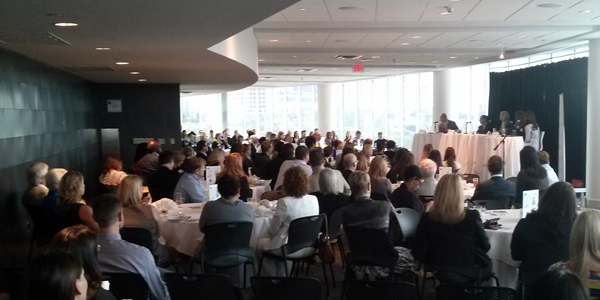
Guest post from 2013-14 Engage Breakfast Series guest blogger Alicia Dietrich. Alicia is a public affairs representative at the Harry Ransom Center at The University of Texas at Austin. See the end of this post for the podcast from the breakfast.
—–
For the final ENGAGE breakfast of the 2013-2014 season, panelists tackled the prickly issue of how media can play a significant role in the dialogue between people with opposing views, especially in today’s politically charged environment.
Panelists included Austin American-Statesman publisher Susie Ellwood, The Texas Tribune editor in chief and CEO Evan Smith, and Dr. Natalie Jomini Stroud, associate professor of communication studies and assistant director of the Annette Strauss Institute for Civic Life at The University of Texas at Austin. The discussion was moderated by KXAN news anchor Shannon Wolfson. Below are some of the key takeaways from the discussion.
#1 – The period of mass circulation media is over.
There is no one media outlet that reaches everyone—we live in a much more fractured environment with many options now. Stroud pointed out that studies show consumers choose news outlets that match their own political pre-disposition. Democrats gravitate toward MSNBC, and Republicans gravitate toward Fox News. This divide can lead viewers to have attitudes that are more favorable to their own side.
#2 “Like” vs. “Respect”
Stroud points out that studies have shown people are more likely to respond and interact with something about which they disagree if they don’t have to click a “like” button. The Texas Tribune experimented with a “Respect” button in in its comments section, and Smith reports that the optics of this language can promote more civil dialogue.
#3 Measure twice, cut once.
In today’s fast-paced media environment, both Smith and Ellwood stressed the importance of media outlets getting the story right over getting it first. If an outlet reports a story that turns out to be inaccurate, they lose credibility and trust of their readers, which can lead to disengagement.
#4 Texas and Austin voters are historically unengaged.
In 2010, Texas had the lowest voter turnout in the country. By 2012, the state only inched up to 48th place. Ellwood and Smith both stressed the importance of reporting on substantive issues in their respective outlets so that voters understand issues and how they affect the citizens of Texas. “The media has a responsibility to address low voter turnout,” said Smith. “We have an obligation to make people believe they have a stake in elections.”
#5 Attracting younger audiences is key to building engaged and informed citizens.
While they take different approaches, both the Statesman and The Texas Tribune are working to attract younger audiences and to engage them while they are still forming their media consumption habits. The Texas Tribune targets college students by holding events on college campuses with state leaders and policy makers. “Reaching that audience is in some ways even more important than reaching gray hairs, because they need to understand the stakes of the decisions being made,” said Smith.
Ellwood notes that the Statesman targets younger readers with their Austin360 and Life sections. Those sections attract younger audiences, who then find other content on the paper’s website.
#6 Calls to action
- Dr. Natalie Jomini Stroud: “I would encourage people to find someone who doesn’t share your politics or find a media source that’s coming from another point of view and watch it. But you can’t just watch it… you have to say to yourself, ‘I know I’m not going to agree with this. I know my natural inclination is going to be to laugh or criticize or counter-argue. But today, my point in doing this is to really try to understand the values that underlie what the other side is saying. Can I understand at least some logic behind their argument?’”
- Susie Ellwood: “Push yourself to engage in real dialogue with people around you about issues. Really talk to people about it. Just reading and consuming the information isn’t enough. I think if you’re not talking actively about it to help you form how you really feel about it—and also impact how people around you feel about it—then you haven’t taken it to the level that you should.”
- Evan Smith: “Come to grips with your open responsibility to be engaged and to participate—to know in a general way (but better in a specific way) the issues that are at play and the players in the game. If you don’t vote, then you forfeit your right to complain about the outcome.”
Full Audio From the Event
Download this audio file (MP3)